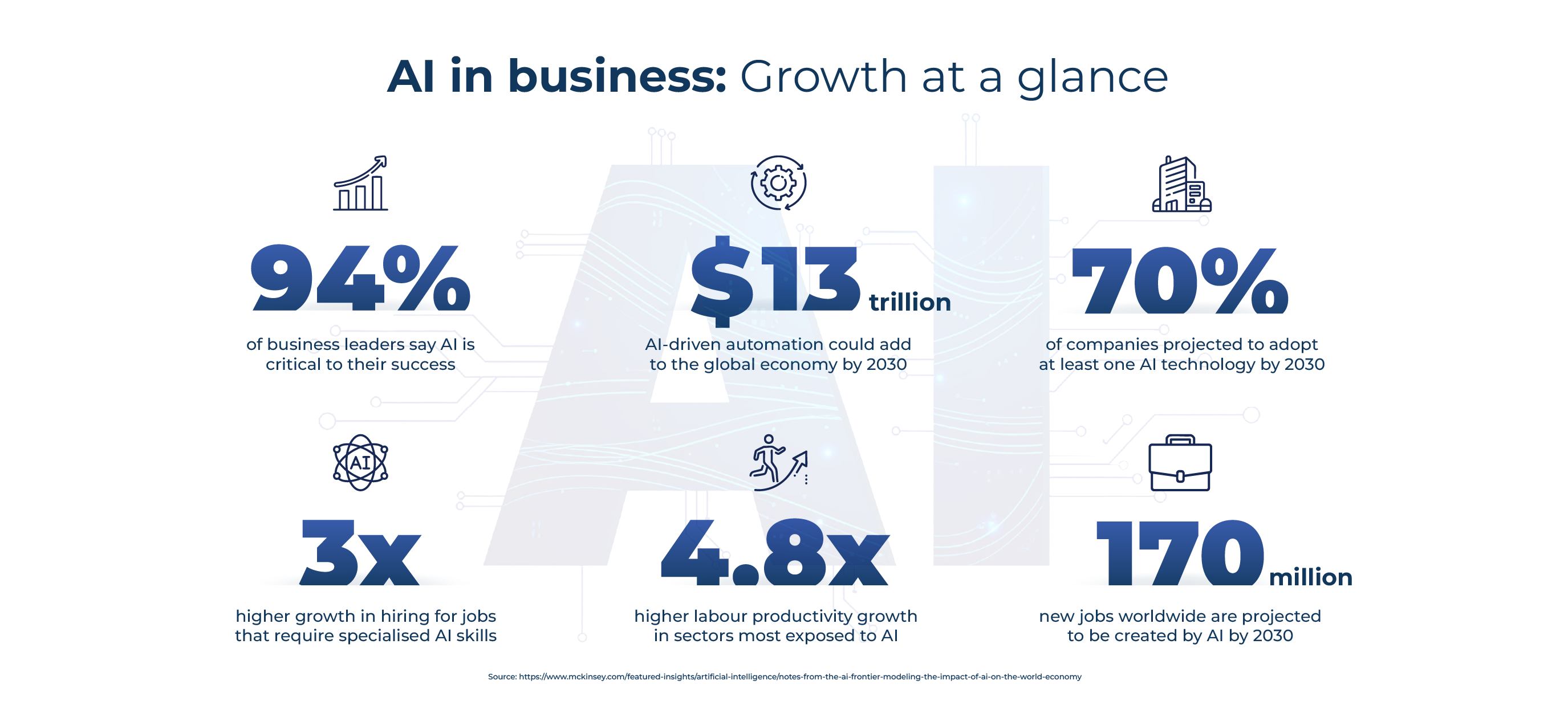
Artificial intelligence in business: Automating operations and strategies
Artificial Intelligence (AI) is transforming business process automation by making workflows faster, smarter and more efficient. A recent EY survey shows that the adoption of generative AI in the workplace has jumped from 22% in 2023 to 75% in 2024, highlighting its rapid growth across industries. This shift underscores the importance of upskilling to keep pace with evolving technology.
AI is like a superhero, making everything simpler, easier and more efficient. The use of AI is changing the way the world functions. Its role in business, education and healthcare is remarkable. It streamlines processes, automates tedious tasks and achieves higher results in less time. Professionals with these digital skills are destined for global success. As per India Today, the demand for AI professionals is surging, with projections indicating millions of new jobs by 2026 and beyond.
Artificial intelligence in business is rapidly reshaping how organisations operate, compete and innovate. By integrating AI into business, companies streamline operations whilst unlocking new opportunities for growth, efficiency and customer engagement.
But before we discuss how AI can make a difference in business, let us first define what exactly business operations are.
Understanding business operations

Business operations include the day-to-day activities that keep an organisation running. It includes everything from HR and finance to supply chain, sales and customer service. As operations grow in complexity, artificial intelligence in business has made automation a game-changer in terms of efficiency, accuracy and scalability. Amazon, for instance, uses AI to forecast demand and provide personalised recommendations, enhancing customer satisfaction during online shopping.
In general, AI-powered decision making and digital transformation in business are redefining how these core area's function, enabling organisations to operate smarter, faster and more efficiently.
Level up your skills with AI!
Why using AI for operations management matters in 2025 and beyond?
The global business landscape is being reshaped by AI and automation. According to recent industry analysis, organisations that integrate artificial intelligence in business operations consistently outperform those that do not. AI in business automation brings speed, precision and scalability, allowing companies to respond to market changes and customer demands in real time. As routine tasks become automated, businesses can focus on strategic initiatives, innovation and customer experience.
The following are a few examples of companies that struggled due to not embracing innovation and technology in their operations:
| Company | Industry | Reason for decline |
| Nokia | Mobile phones | Slow adoption of digital transformation in business ecosystems; failure to innovate. |
| Blackberry | Mobile phones | Focused on enterprise users, resisted touchscreen and consumer trends, lagged in various features. |
| Kodak | Photography | Hesitated to transition from film to digital photography despite pioneering digital camera technology. |
| Yahoo | Internet services | Missed opportunities in search and social media, slow to adopt AI in business strategy. |
Failure to embrace digital transformation in business has led to the downfall of once-dominant companies like Nokia, Blackberry and Kodak. Nokia, which once led the mobile phone market, was slow to adopt smartphone innovations, clinging to outdated software and underestimating the importance of app ecosystems, which allowed competitors like Apple and Android to capture the market. Similarly, BlackBerry’s focus on enterprise users and reluctance to embrace touchscreen technology caused it to lose relevance as consumer preferences shifted.
Kodak, despite inventing the first digital camera, hesitated to move away from its profitable film business, missing the digital photography revolution and eventually filing for bankruptcy in 2012.
These examples highlight the importance of integrating AI in business strategy to stay agile, customer-focused and competitive in 2025 and beyond. Without embracing AI-powered decision making and smart business technologies, companies' risk being outpaced by more innovative rivals.
How AI helps in business operations
AI in business automation transforms traditional workflows by automating repetitive, rule-based tasks. Beyond that, organisations also use AI tools for business growth by analysing big data and developing strategies tailored to different audiences. Below is a quick list of how AI can assist businesses in various ways:
1. Streamlining business processes:
Robotic process automation (RPA) is at the forefront of AI in business automation. It enables businesses to automate repetitive tasks across finance, HR and supply chain management, significantly reducing costs and errors. For example, banks use AI-powered fraud detection systems and automation to freeze suspicious accounts in real time, ensuring security and compliance.
2. Enhanced data analytics and insights:
AI-powered decision-making leverages big data to provide actionable insights. Machine learning for operations allows companies to forecast demand, optimise inventories and personalise marketing strategies. Amazon, for instance, uses AI in its business strategy for inventory forecasting and deploys robots for stock movements, resulting in optimised logistics and improved service delivery.
3. Intelligent automation:
The combination of AI and robotic process automation (RPA) creates intelligent automation, enabling real-time workflows and adaptive business processes. This synergy empowers artificial intelligence in business to handle complex scenarios, such as dynamic resource allocation and responsive customer service, with minimal human intervention.
4. Personalisation and customer experience:
AI tools for business growth enable hyper-personalisation, tailoring products, services and communications to individual customer preferences. AI chatbots handle routine queries efficiently, whilst humans step in for sensitive or complex issues, ensuring a seamless customer experience. Companies like Netflix use AI to analyse customer behaviour and preferences, delivering tailored content and product suggestions that boost satisfaction and loyalty.
5. Optimised resource allocation:
AI optimises resource allocation by analysing data across production, logistics and workforce management. Predictive dashboards equip leaders with real-time insights, supporting smarter decisions and better performance tracking in artificial intelligence in business applications.
The future of AI and the global landscape
Smart business technologies and AI are fundamentally reshaping work, creating smarter, faster and more efficient business environments. As hybrid roles emerge, the demand for AI in business strategy and supporting digital skills intensifies.

Human-AI collaboration is becoming the new normal, blending operational efficiency with AI and emotional intelligence. The most successful organisations will be those that align artificial intelligence in business, foster ethical leadership and continuously train and support their workforce.
Demand for digital skills and lifelong learning

Job postings for AI, machine learning (ML) and Generative AI (GenAI) roles have surged, with AI and ML positions growing by 65% since 2019 and GenAI roles skyrocketing by 411% (Economic Times,2024). As AI brings digital transformation to business operations and strategies, these skills are in high demand. Lifelong learning is essential for employees and leaders to adapt to today’s smart business technologies. Professionals must invest in upskilling themselves to thrive in the era of AI-powered business.
The HND in Digital Technologies (Artificial Intelligence (AI) Solutions and Applications) by GBS Dubai is a comprehensive two-year diploma programme that provides students with both foundational and advanced skills in AI and smart business technologies. The curriculum covers essential areas such as machine learning for operations, big data and application development, combining theoretical knowledge with hands-on, practical learning experiences.
Students benefit from real-world assignments and projects, developing critical skills like networking, strategic decision-making and teamwork. By enrolling in such programmes, individuals can ensure they are ready to meet the demands of industries transformed by artificial intelligence in business.
Connect with our student support team today to learn more and begin your AI journey!
FAQs about AI in business automation
AI automation enables businesses to enhance efficiency, lower operational costs, reduce human error and scale operations more effectively by automating everything from routine tasks to complex workflows.
AI is used for analysing large volumes of data to generate actionable insights. It enables faster and more efficient processing of massive datasets, leading to quicker and better-informed decisions.
You can use AI tools to analyse data quickly, automate repetitive tasks, predict trends and more. This helps your business grow faster and work smarter.
Educational programmes such as GBS Dubai’s HND in Digital Technologies provide practical and theoretical knowledge of AI, ML operations and digital technologies, preparing graduates for in-demand roles and helping organisations build a future-ready workforce.
Digital literacy, data analysis, machine learning, problem-solving and adaptability are crucial. Lifelong learning and continuous upskilling are necessary to keep pace with smart business technologies.
Browse our courses
GBS Dubai offers a wide range of industry-focused education courses, designed to fit around your busy schedule.